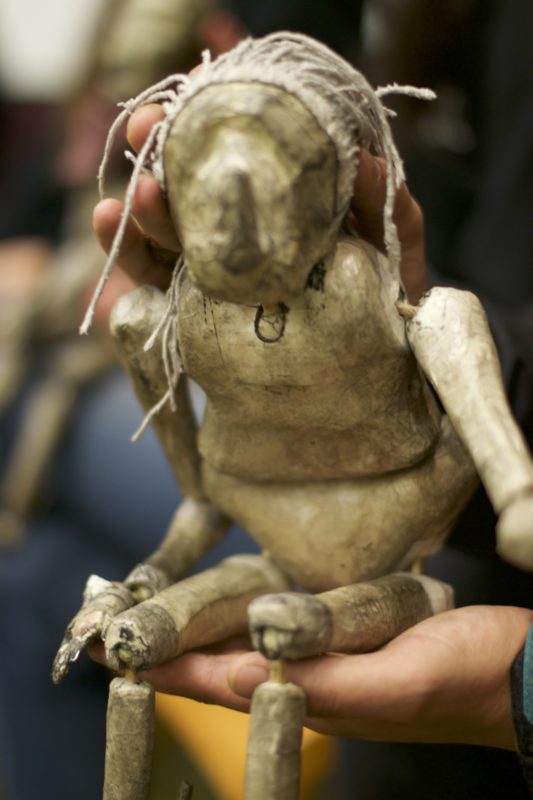
Yesterday I introduced a Mexican theatre company that seeks out marginal populations, interacts with them and tells their stories. Today I want to report again on a Chilean company that does something similar and then converts it into a different kind of performance: non-verbal puppet plays.

Santiago Tobar and his puppetry troupe Silencio Blanco construct marionettes from a newspaper base and then have them perform in silence. Their goal is to show la belleza de las cosas simples y cotidianas (the beauty of simple, everyday things), telling stories about the traditional livelihoods of Chilean workers, and what is happening to them in an age where industrial exploitation, capitalistic greed and ruthless industrialization at best costs people their livelihood and at worst their lives.

Silencio Blanco (just like Teatro Linea de Sombra) has an international presence. Their stories are universal and the absence of spoken language facilitates a direct interaction with the narrative; and so it is no surprise that there are no barriers to understanding when Syrian refugee children in Denmark encounter the puppets, or the plays are presented in the US, Great Britain or Portugal.

Thanks to http://www.boomarts.org last year Portlanders got to see “Chiflón, the silence of the coal,” a play about the hazards of working in the Chilean mines and the anticipatory fear of the women who never know if their husbands, brothers and sons will return. We learned about the working conditions in post-industrial 21st century Chile, and the traditional village life explored by the troupe’s members in their lengthy stays at Lota. The construction of the puppets, sets and their movements were exquisite, and the silence somehow gave those who were represented a real voice.

Their current project is called Pescador; it explores the lives of artisanal fishermen. The entire company spent time in the coastal town of Constitucion to learn about the ways traditional ways of living from the sea are now affected by international companies, industrialization of fishing and international law regulation quotas, and last but not least climate change and pollution that affect the health of the ocean.
Chile, by the way, is quite aware of the threat of climate change to their country. Minister of the Environment Mena said last summer: “climate change is now regarded by most Chileans as their greatest external threat – “what was for some decades climate change alarmism is now a reality in Chile”. Therefore, he claims, “there is no climate negationism” in Chile. To counteract the problems associated with climate change and to further raise awareness, the government has implemented various policies. In June, for instance, a national policy was announced that will bring compulsory climate change classes to Chilean schools.”




The very young members of this troupe manage to convey to the viewer some important truths. They elicit a sense of empathy that extends beyond the one they themselves show by bringing their interest to the people of the communities with whom they form alliances. I found their work both poetic and political in ways that had a lasting impact.





Carl Wolfsohn
So wonderful. I beg for even one DAY of silence from the Trump administration.